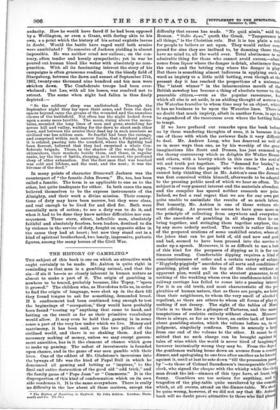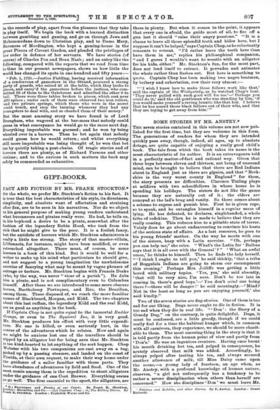THE HISTORY OF GAMBLING.*
THE subject of this book is one on which an attractive work ought certainly to be made. Mr. Ashton is quite right in reminding us that man is a gambling animal, and that the sin—if sin it be—is so closely inherent in human nature as almost to make a part of it. The origin of gambling is nowhere to be traced, probably because, like Topsy, "'specs it growed." The children who, as Herodotus tells us, in order to find the origin of language, were shut up in the dark till they found tongue to ask for something, demanded bread. If h confinement had been continued long enough to test the beginnings of "occupation," they would have probably been found "tossing up" anything that came to hand, and betting on the result as far as their primitive vocabulary would allow. It may even be held that gaming is in some sense a part of the very law under which we live. Money and matrimony, it has been said, are the two pillars of the civilised world, and there is no shaking them. And the necessary making of money, unless we may except govern- ment annuities, has in it the element of chance which goes to make up gaming. The safest of investments is founded upon chance, and in the game of war men gamble with their lives. One of the oddest of Mr. Gladstone's incursions into the byways of life was the kind of Papal Bull in which he denounced all gaming and betting as " impious," to the final and entire destruction of the good old " odd trick," and the family game of " Pope Joan" or " Commerce." It is the disproportion of this kind of condemnation which on its own side condemns it. It is the same everywhere. There is really no difficulty in the law about all these matters, except the • The History of Gambling in England. By John Ashton. London: Doak- worth and Co. 178. 6d.] difficulty that excess has made. "Ne quid nimis," said th Roman. " MrVey ,y s," quoth the Greek. "Temperance it all things," is the Christian role. But it is too plain a rut for people to believe or act upon. They would rather corn pound for sins they are inclined to, by damning those thej have no mind to, all the world over. Total abstinence is at admirable thing for those who cannot avoid excess,—absti• nence from liquor where the danger is drink, abstinence herr the cards and the betting ring where the danger is play But there is something almost ludicrous in applying such word as impiety to a little mild betting, even though at the present day it has reached the proportions of a nuisance The "latest winner" in the inharmonious mouth of the British newsboy has become a thing of absolute terror to the peaceable citizen,—even as the popular racecourse, for which all else is set aside, is an abiding thought of sorrow to the Waterloo traveller to whom time may be an object, which it has no business to be upon the Waterloo lines. There is no doubt that much impiety, albeit in another form, is apt to be engendered of the racecourse even where the betting fails to tempt.
If we have prefaced our remarks upon the book before us by these wandering thoughts of ours, it is because it is one of those with which the reviewer finds it very difficult to deal. Mr. Andrew Lang, who has deserved so well of us in more ways than one, as by his worship of the great imaginations like Scott and Dumas, has just summed up the thorny controversy which so delights Sir Walter Besant and others, with a brevity which in this case is the soul of wit and truth put together. The "demand for books," he says, " comes from the people who write them." And we cannot help thinking that in Mr. Ashton's case the demand was first conceived within himself, afterwards to be adapted to the pressing public need of which we hear so often. The subject is of very general interest and the materials abundant, and the compiler has spared neither research nor pains Indeed, we feel a real regret that we are for our own part quite unable to assimilate the results of so much labour. But honestly, Mr. Ashton is one of those writers who want editing. At present he seems to have gone more on the principle of collecting from anywhere and everywhere all the anecdotes of gambling in all shapes that he can bring together, and stringing them together anyhow, than by any more orderly method. The result is rather like one of the prepared orations of some unskilled orator, where all the jokes that can be got hold of, old and new and good and bad, seemed to have been pressed into the service to make up a speech. Moreover, it is as difficult to use a book of this kind for the purposes of dipping as it is for con. tinuous reading. Comfortable dipping requires a kind of conscientiousness of order and a certain variety of subject. "Higgledy-piggledy" anecdotes of all sorts and conditions of gambling, piled one on the top of the other without as apparent plan, would pall on the stoutest gamester, to sal nothing of the weakling whom even the confidence-trick in ; railway carriage has failed to rouse into a passing interest For it is an old truth, and most characteristic of the per. plexities of human nature, that as there are people, no better than their neighbours, to whom the very smell of alcohol repellent, so there are others to whom all forms of play are nothing if not dreary. The sight of the tables of Monte
Carlo is to them like a glimpse of Tartarus, and the easier
temptations of roulette entirely without charm. Moreover, there is always, as far as we know, an entire lack of burnout
about gambling-stories, which the volume before us, to out
judgment, singularly confirms. There is scarcely a lantn from one end of the volume to the other. It must be ai mitted that no such charge can be brought against tie tales of wine which the world is never tired of laughing 34 however intrinsically wrong they may be. From the bra the gentleman walking home down an avenue from a conntrl dinner, and apologising to one tree after another as he knock against it, until at last he sate down "till the procession 'As- hy "—to those of Colonel Saunderson's incomparable Coo clerk, who signed the cheque with the whisky while the cba man drank the ink—sinners of this type have, at least, funny. Gamblers are too serious for anything, and t' tragedies of the play-table quite unrelieved by the corn" i which, at all events, attend on the dinner-table. We sho '- be quite wrong, however, if we did not say that Mr. Ashtoe book will no doubt prove attractive to those who find p
in the records of play, apart from the pleasure that they take in play itself. We begin the book with a learned distinction between gambling and gaming, and go on through Jews and Mahommedans down to Christian play, and to Dame Mary,
Baroness of Mordington, who kept a gaming-house in the great Piazza of Covent Garden, and pleaded the privileges of her order in defence of her servants. We have stories (of
course) of Charles Fox and Bean Nash ; and an entry like the following, compared with the reports that we read from time
to time in our present newspapers, shows us how little the world has changed its spots in one hundred and fifty years:— Feb. 1, 1751.—Justice Fielding, having received information of a rendezvous of gamesters in the Strand, procured a strong party of guards, who seized 45 at the table, which they broke to pieces, and carry'd the gamesters before the justices, who com- mitted 39 of them to the Gatehouse and admitted the other 6 to bail. There were three tables broken to pieces, which cost near £60 apiece ; under each of them were observed two iron rollers, and two private springs, which those who were in the secret could touch, and stop the turning whenever they had any youngsters to deal with, and so cheated them of their money."
But the most amusing story we have found is of Lord Brougham, who wagered at the bar-mess that nobody could guess in what conveyance he would go to the races next day.
Everything improbable was guessed ; and he won by being wheeled over in a barrow. Then he bet again that nobody
would guess how he would return ; and whilst everything still more improbable was being thought of, he won that bet too by quietly taking a post-chaise. Of tragic stories and of horrors there are plenty, as of Richard Parsons and other victims ; and to the curious in such matters the book may safely be commended as exhaustive.























































 Previous page
Previous page